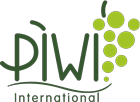Study by Sarah Wettstein, Matthias Stucki, Matthias Meier, Peter Schumacher, Jürg Buchli on behalf of the Federal Office for the Environment (FOEN)
In addition to animal foods, the consumption of alcohol and other luxury foods contributes significantly to the environmental impact of nutrition. In 2014, with 35 liters per capita and year after beer, wine was the most consumed alcoholic beverage. The management of vineyards is associated with a high consumption of resources and energy, as well as with production-related emissions to the air, soil and water. Emissions were reduced with the introduction of integrated production (IP). Organic production goes one step further by banning chemical-synthetic pesticides and increasing the cultivation of fungi-resistant (PIWI) varieties.
The aim of the present study is to assess the environmental impact of wine production in Switzerland with the two production systems mentioned and the cultivation of PIWI varieties using an ecological balance sheet and to highlight the most important influencing factors. In addition, a biodiversity assessment was carried out to show the effects of different production systems on biodiversity.

